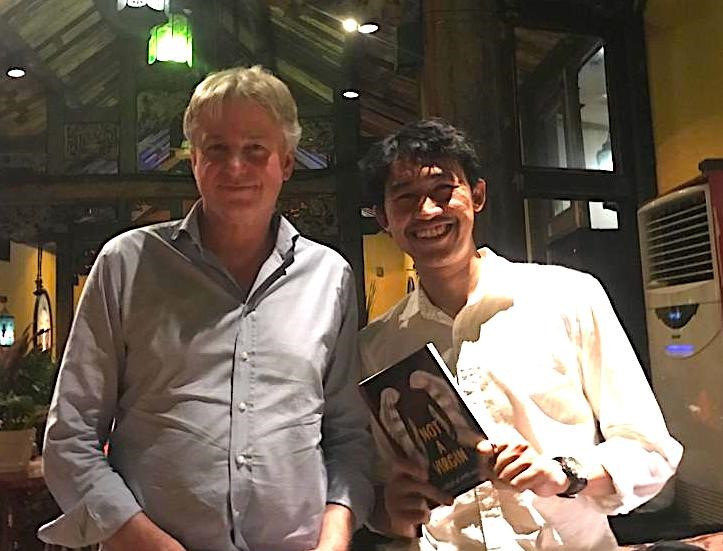Popular Reads
Top Results
Can't find what you're looking for?
View all search resultsPopular Reads
Top Results
Can't find what you're looking for?
View all search resultsThe increasing global visibility of Indonesian authors
Change text size
Gift Premium Articles
to Anyone
F
or nearly four years since Indonesia attended the 2015 Frankfurt Book Fair as a guest of honor, Indonesian literature has been going through an exciting period in terms of global recognition.
The Frankfurt Book Fair is the world’s largest marketplace for printed and digital content. Its CEO, Juergen Boos, and his colleague, the vice president of business development for Southeast Asia, Claudia Kaiser, recently spoke to The Jakarta Post about how the landscape has changed for literature.
The Frankfurt Book Fair has been welcoming guests of honor since the late 1970s and yet, as Kaiser pointed out, it took until 2015 for a Southeast Asian country to be invited.
Themed “17,000 Islands of Imagination”, the Indonesian pavilion at the 2015 Frankfurt Book Fair exhibited the cultural and literary riches of the nation. More than 70 writers presented at 500 events covering a vast range of topics. There were also music and dance performances, works of art, photographic exhibitions and film screenings.
Around Rp 150 billion (US$11.5 million) was allocated to support Indonesia's activities as the guest of honor. The opportunity was seen by some as Indonesia’s way of entering the global book industry. So the (eleven) million dollar question would seem to be this: What did Indonesia gain from the event?
According to Boos and Kaiser, the answer is “a lot”.
“It’s the entrance for Indonesia to the international market,” Kaiser said as she launched into an impressive list of organizations created in the last four years.
For example, the National Book Committee (KBN) was formed under the guidance of the Education and Culture Ministry in the beginning of 2016 to help Indonesian publishers gain visibility in the global market.
The committee runs a government-sponsored translation program, LitRI, to translate Indonesian literature and other works about Indonesian culture into foreign languages.
A lack of translations has in the past been a hindrance for Indonesian authors looking to gain an international audience.
“Translations are very important. There are very few translations from Bahasa Indonesia into other languages. It was a huge problem when Indonesia was guest of honor [at the 2015 Frankfurt Book Fair], so we actually had to look into titles that had been translated into English and then translate from English into German,” Boos said.
In addition, Indonesia has also been active in attending international book fairs, such as the Beijing International Book Fair (BIBF) in China in August 2017 and the Bologna Children’s Book Fair – the biggest children’s book fair in the world – in Italy in March 2018.
In less than 10 days, Indonesia will also attend the 2019 London Book Fair.
Continuing the theme of “17,000 Islands of Imagination”, Indonesia will be the London Book Fair’s Market Focus, taking over a status held in 2018 by the Baltic Countries of Estonia, Latvia and Lithuania. Indonesian publishers will have the opportunity to forge new business partnerships and expand into global markets.
For Boos and Kaiser, the outlook for Indonesia at the London Book Fair, which will start on March 12, is highly promising – that is, assuming they have learned from their past experiences and focused more on translations.
Boos said with all the international exposure, Indonesian independent publishing houses had a lot to look forward to.
“Here [Indonesia], the independents are getting strong. So it’s quite a lively scene,” he said.
Boos, clearly excited by the literary scene in Indonesia and the fresh literature being produced, said the world was dying to see much more from Indonesian writers and publishers, especially on the content that deals with social issues.
“This [Indonesia] is a very young society, a growing society and you still don’t know where [Indonesia] is going [...] I think it’s very interesting to see how the writers deal with their issues in society,” Boos said.
Despite staying in town for only a few days, Boos also managed to meet with one of his favorite Indonesian writers, Nuril Basri, whose work Not a Virgin (2017) was published by the Lontar Foundation in English.
Speaking to the Post, the Tangerang-based author spoke of the importance of being part of the Frankfurt Book Fair.
He attended the book fair in 2017 to read an excerpt from Not a Virgin. It was at this time when he was finally able to embrace himself as a writer for the first time.
“Before that I was never serious about it [writing], perhaps because I was afraid,” Nuril said. (hdt)
The writer is an intern at The Jakarta Post.











